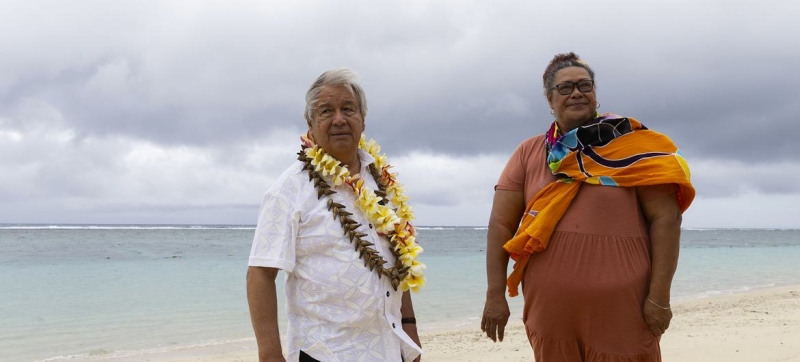
UN Secretary-General Antonio Guterres (left) with a Samoan woman. UN chief calls for ‘climate justice’ for Pacific nations Climate and Environment
Pacific island nations facing climate change and economic crises will only be able to address their “existential” challenges if they have access to adequate funding, UN Secretary-General Antonio Guterres said Thursday during a visit to Samoa.
“We are fighting hard for climate justice… [but] we are not seeing the funds that we need, and that is why we are asking for reform of the international financial institutions so that countries like the Pacific nations can get the funding,” the UN chief told reporters in the Samoan capital of Apia.
During his visit, he met with residents of the island nation forced to flee their homes because of rising sea levels and coastal erosion. Guterres said the islands’ ambitious plans to tackle an “existential threat” had been delayed by a lack of promised funding.
Keeping Commitments
Guterres stressed that pledges by rich countries had been insufficient to offset the economic impact of climate-related disasters.
In 2022, the UN Climate Change Conference (COP27) in Egypt agreed to launch the Loss and Damage Fund, and developed countries committed to doubling their climate finance in 2021. The Secretary-General noted that these plans have not received sufficient support.
“We need all countries to deliver on their climate finance pledges and make significant progress on this issue at this year’s Climate Conference,” he stressed.
Natural Disasters
The UN chief noted that climate shocks, such as the 2009 tsunami that killed at least 192 people, remain a threat to local communities.
“We see some people moving inland. But we also see people coming back and rebuilding their homes after the disaster. We see a determination among the population to deal not only with the impact of the tsunami, but also with the impact of rising sea levels, storms and cyclones,” he said.
Financial Inequality
Many developing countries like Samoa, which are also on the front lines of the climate crisis, are forced to borrow from international lenders at elevated rates, effectively driving them into debt. To address these structural inequalities, the UN has worked with SIDS to develop a new national income indicator, the Multidimensional Vulnerability Index.
Guterres called on international organizations to take this indicator into account and provide concessional financing for development projects and climate change protection.
Read also:
Antigua and Barbuda Summit: UN Chief Proposes Three-Area Reforms
The Secretary-General also reiterated his desire for SIDS to have access to some $80 billion in special rights funding borrowing.
New sources of revenue like this are critical for countries like Samoa, which have lost tourism income due to the COVID-19 pandemic and have not received support from the international community, Guterres stressed.
